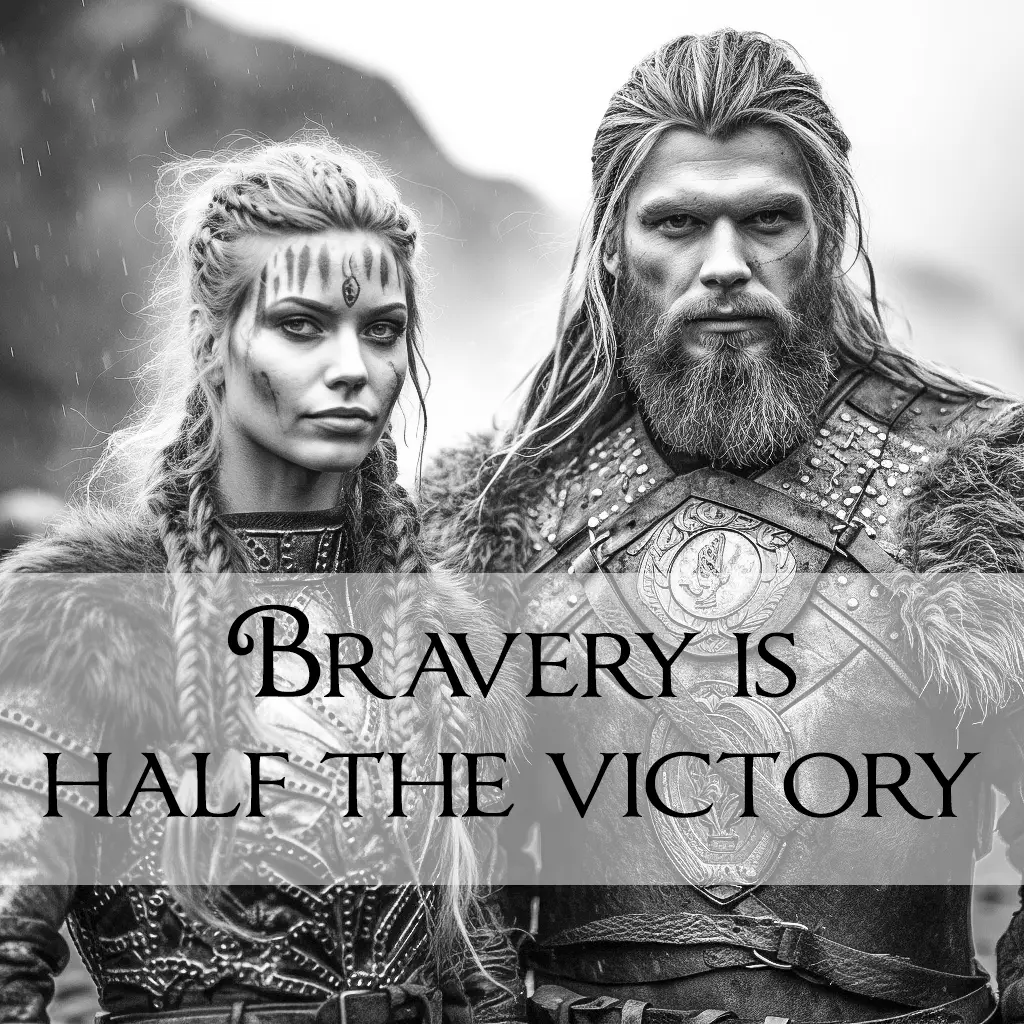
Bravery is half the victory
Bravery is half the victory – The Saga of Harald Hardrade, c.103
Harald Hardrade’s saga is a fascinating tale of Viking bravery and resilience. Facing numerous challenges, he displayed remarkable courage in his pursuits. It’s intriguing how the concept of bravery is often intertwined with the ultimate quest for victory.
The saying “Bravery is half the victory” captures the essence of Harald Hardrade’s adventurous spirit and determination on the battlefield. It’s a testament to the idea that one’s mindset and courage play a significant role in achieving success.
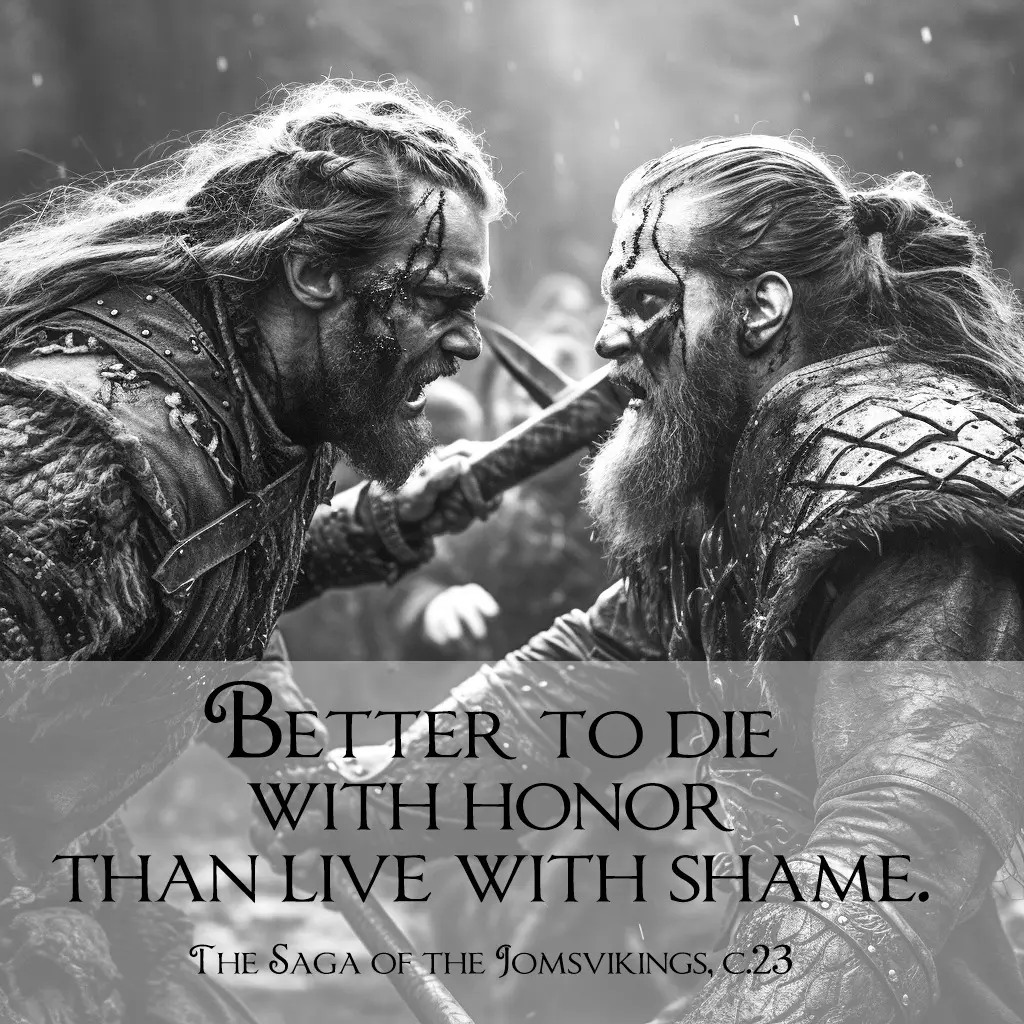
Better to die with honour than live with shame
Better to die with honor than live with shame – The Saga of the Jomsvikings, c.23
That’s an old saying that reflects a strong sense of honour and valor. It’s often a matter of personal perspective. Some might value a principled life even in the face of great difficulty, while others might prioritize survival and the chance to make amends or influence change in their lifetime.

Wisdom is welcome wherever it comes from
Wisdom is welcome wherever it comes from – Bandamanna Saga, c.10
This loosely translates to “Stay teachable. Keep an open mind, and try to learn from all types of situations.”
advocates for an open-minded approach to learning and understanding, suggesting that wisdom can manifest from diverse individuals, experiences, or even unexpected sources.
It encourages people to be open to insights from anyone, regardless of their background, social standing, or origin. The idea is that valuable wisdom can come from unexpected places, and to dismiss it based on its source could mean missing out on valuable knowledge and perspective.

Where wolf’s ears are, wolf’s teeth are near
Where wolf’s ears are, wolf’s teeth are near – Volsunga Saga, C.19
The quote “where wolf’s ears are, wolf’s teeth are near” from the Volsunga Saga suggests the idea that where there is a possibility of danger or threat, there is likely to be an actual threat present.
In other words, it advises being cautious and aware of your surroundings, especially in situations that may appear risky or uncertain. It reflects the Viking mindset of facing challenges directly and being prepared for potential dangers.
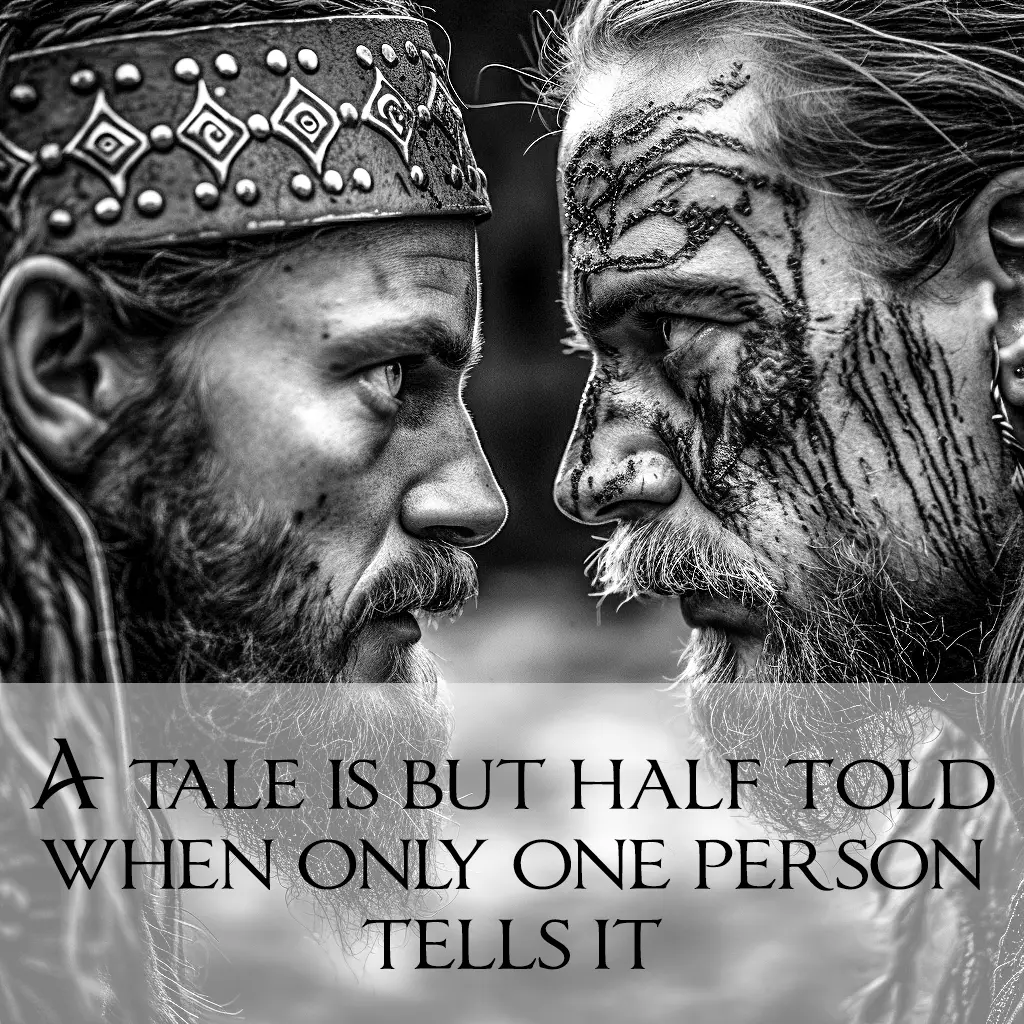
A tale is but half told when only one person tells it
A tale is but half told when only one person tells it – The Saga of Grettir
A tale is but half told when only one person tells it” from The Saga of Grettir shows the importance of different perspectives that comes from multiple voices contributing to a story.
It suggests that a complete understanding of a tale or event requires hearing it from various viewpoints. This idea aligns with the tradition of storytelling prevalent in Viking culture, where narratives were passed down through generations, and the communal aspect of storytelling was highly valued.
Each narrator might bring their own insights and nuances, contributing to a more comprehensive and nuanced narrative.
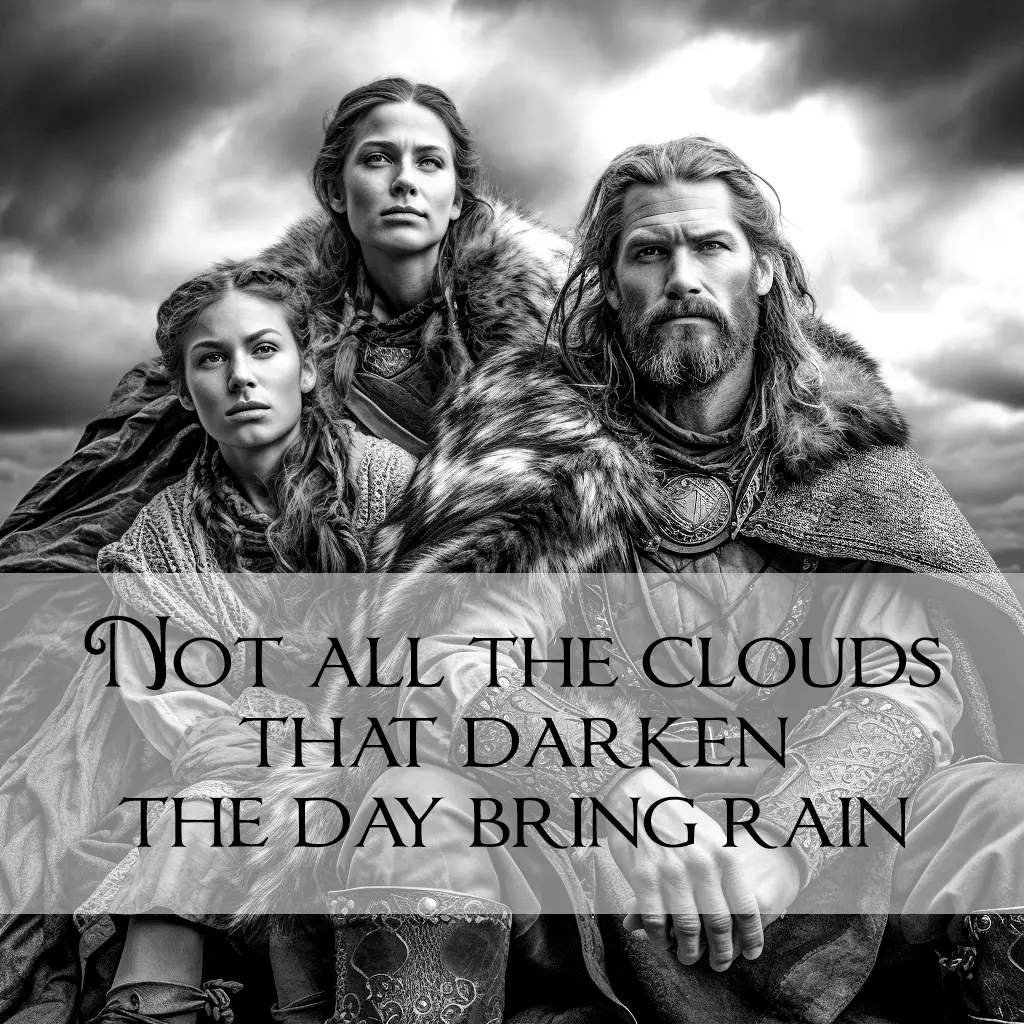
Not all the clouds that darken the day bring rain
Not all the clouds that darken the day bring rain – Saga Heitharvega, c.7.
The quote “Not all the clouds that darken the day bring rain” from Saga Heitharvega suggests a metaphorical interpretation. In a broader sense, it conveys the idea that not every difficulty or challenge we face will necessarily result in a negative outcome.
Just because there are obstacles or problems (symbolized by the dark clouds), it doesn’t mean that they will lead to a detrimental or lasting impact (rain).
This can be seen as a message of hope and resilience, encouraging individuals to persevere through tough times with the understanding that not all difficulties will have long-lasting or severe consequences. It reflects a nuanced perspective on adversity, acknowledging that there can be moments of darkness that do not necessarily result in negative outcomes. So don’t give up.!!
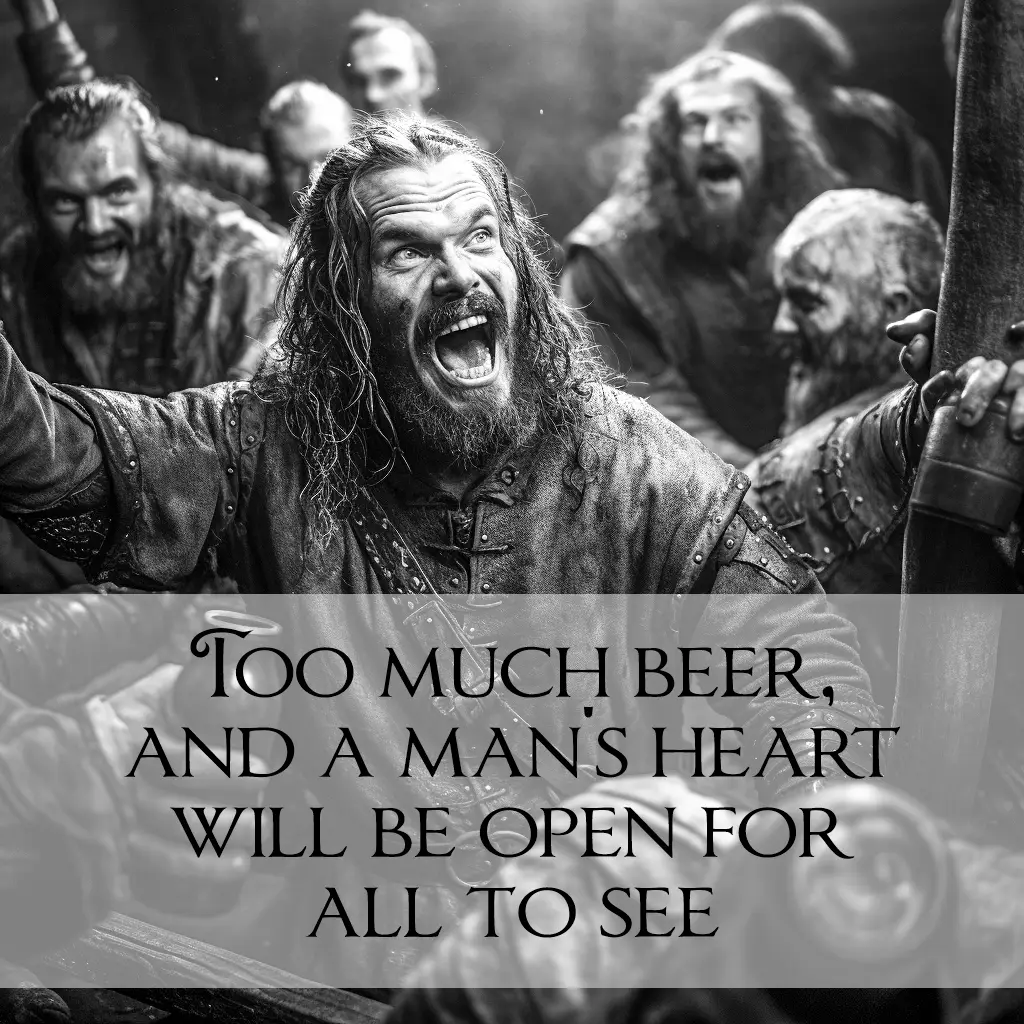
Too much beer, and a man’s heart will be open for all to see
Too much beer, and a man’s heart will be open for all to see” from The Saga of Olaf Haraldsson suggests that excessive alcohol consumption can lead a person to be more expressive and revealing of their thoughts and emotions.
It highlights the idea that when someone is intoxicated, their inhibitions may be lowered, making them more transparent or open about their feelings.
This statement reflects a common observation about the effects of alcohol on behavior and the way it can influence social interactions. It serves as a cautionary or humorous reminder about the potential consequences of overindulgence in alcohol and the impact it can have on one’s self-control and discretion.
So drink responsibly as like another popular of our non viking quotes “Loose Lips Sink Ships!”
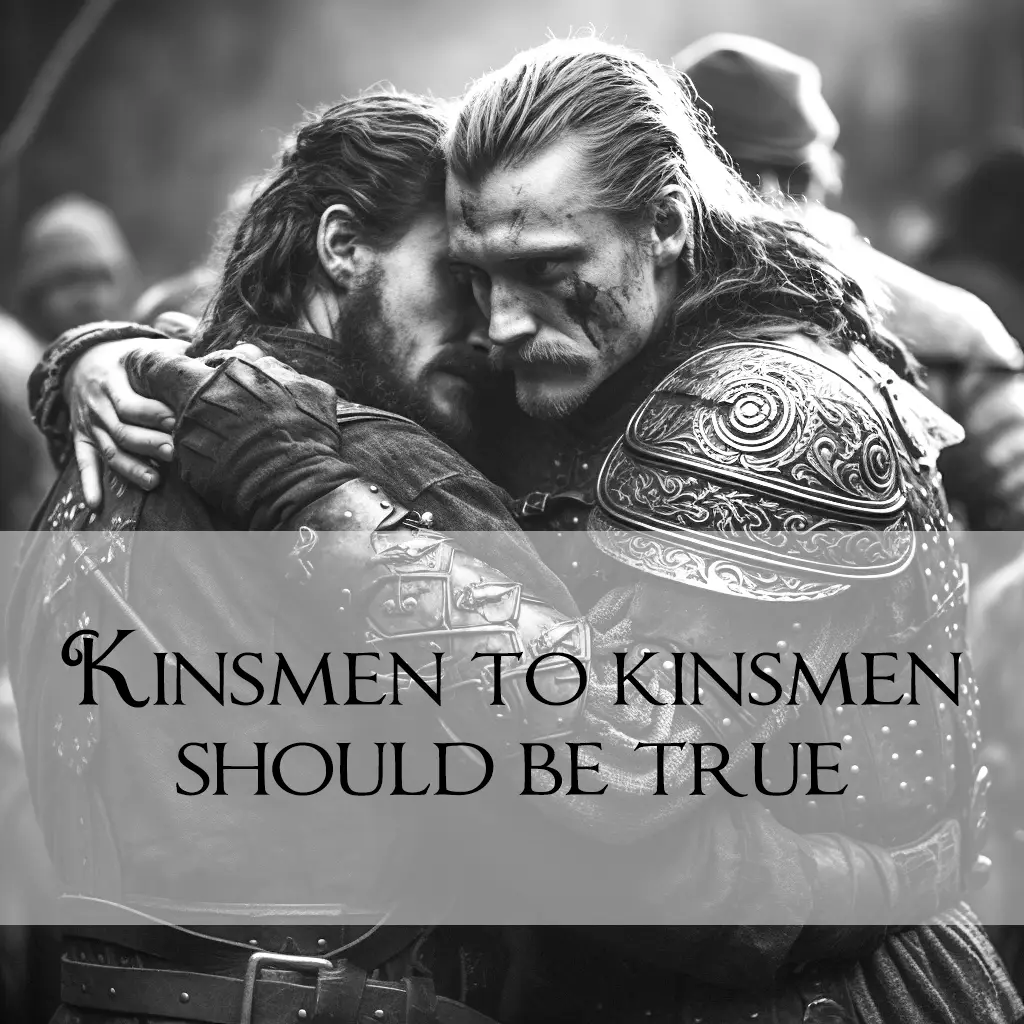
Kinsmen to kinsmen should be true
Kinsmen to kinsmen should be true. – The Saga of Olaf Haraldsson, c.186.
“Kinsmen to kinsmen should be true” from The Saga of Olaf Haraldsson focuses on the importance of loyalty and honesty within family relationships. It suggests that family members should be trustworthy and faithful to one another. This sentiment aligns with traditional values that prioritize the bonds of kinship and expect mutual support and trust among relatives.
In the context of Viking sagas and historical Norse culture, where family ties and honour held significant importance, this statement reflects the cultural and moral expectations regarding loyalty within the family unit. It reinforces the idea that trust and reliability should be maintained, especially among kinsmen.
Be good to one another!!

Let another’s wounds be your warning
Let another’s wounds be your warning. – Njal’s Saga, c.37
“Let another’s wounds be your warning” from Njal’s Saga suggests the importance of learning from the experiences of others.
The idea that observing and understanding the consequences or hardships faced by someone else can serve as a cautionary lesson for oneself. This advice encourages individuals to be mindful of the mistakes or misfortunes of others, using them as a guide to make informed decisions and avoid similar pitfalls.
In the context of Norse sagas, where honour and wisdom were highly valued, this phrase reflects the cultural emphasis on learning from the experiences of those around you to navigate life more successfully.
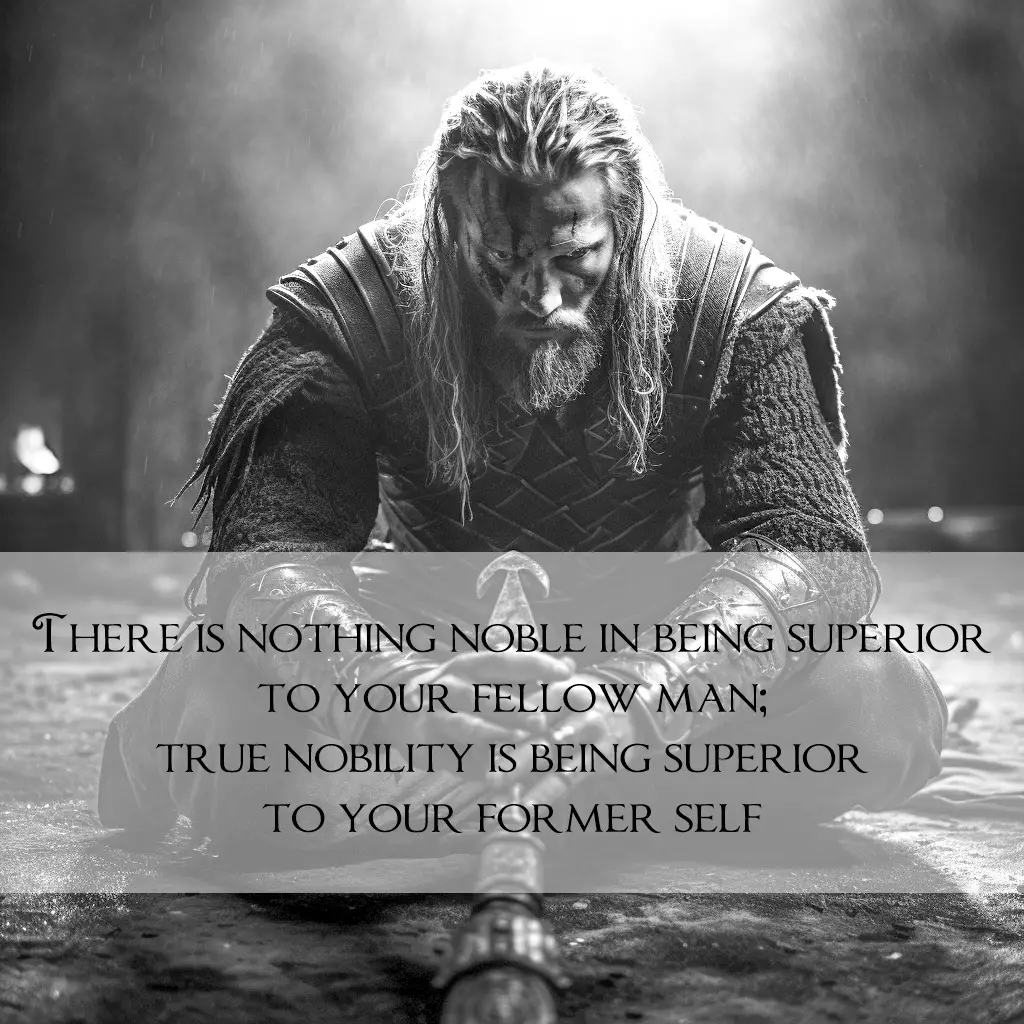
There is nothing noble in being superior to your fellow man; true nobility is being superior to your former self
“There is nothing noble in being superior to your fellow man; true nobility is being superior to your former self”
This is attributed to Ragnar Lothbrok carries a profound message about personal growth and humility. It suggests that genuine nobility and greatness lie not in outdoing others but in surpassing one’s own previous achievements and personal limitations.
This perspective encourages self-improvement, emphasizing the importance of continual self-reflection and development. It aligns with themes of honour and individual strength found in Viking sagas, where characters often faced challenges and sought to better themselves through their experiences.
Which we think is a hard thing to do but worth it, we are always trying to improve who we are and how we are..
Live Life well!

It is better to stand and fight. If you run, you’ll only die tired
“It is better to stand and fight. If you run, you’ll only die tired.”
A steadfast determination and courage in the face of adversity. It suggests that confronting challenges head-on, rather than fleeing from them, is preferable because running away only prolongs the inevitable and exhausts one’s energy in the process.
In the context of battle or conflict, it advocates for bravery and resilience, implying that facing obstacles directly allows for a chance to overcome them, whereas avoiding them only delays the outcome. This mindset reflects themes of honor, strength, and perseverance commonly found in Viking culture and sagas.
So don’t ignore that challenge that faces you in your life. although hard it is to face, inevitably it will only get worse the more you leave it..
Channel your inner Viking.!!!
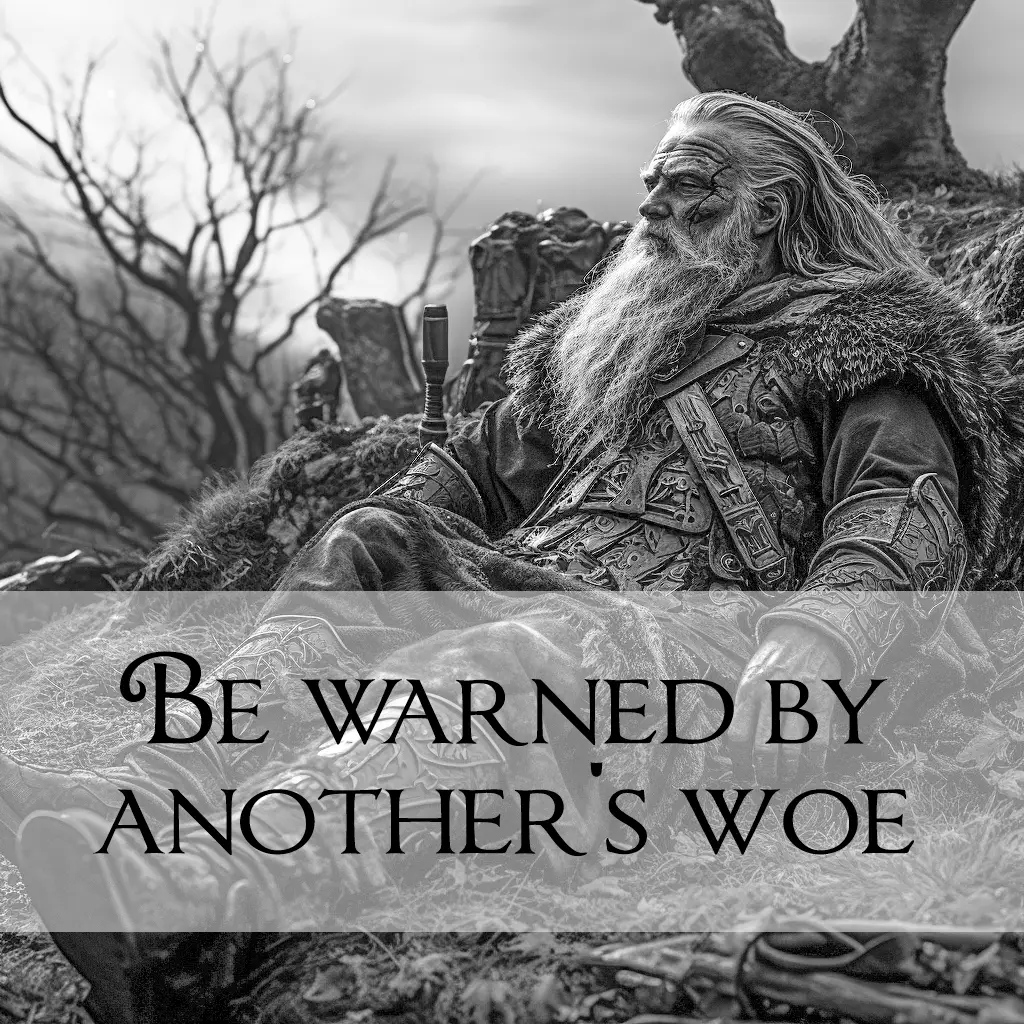
Be warned by another’s woe
“Be warned by another’s woe” from Njal’s Saga
“Be warned by another’s woe” from Njal’s Saga advises individuals to learn from the misfortunes or difficulties experienced by others. This phrase underscores the importance of using the experiences of others as a cautionary tale, helping to guide one’s own decisions and actions. In essence, it promotes the idea of gaining wisdom through observation and understanding the consequences faced by others in similar situations.
In a broader context, this piece of advice encourages empathy, reflection, and a proactive approach to avoiding potential pitfalls by heeding the lessons learned from the challenges faced by those around us. It aligns with the Norse cultural emphasis on learning from the stories and experiences of others, promoting both personal growth and communal well-being.
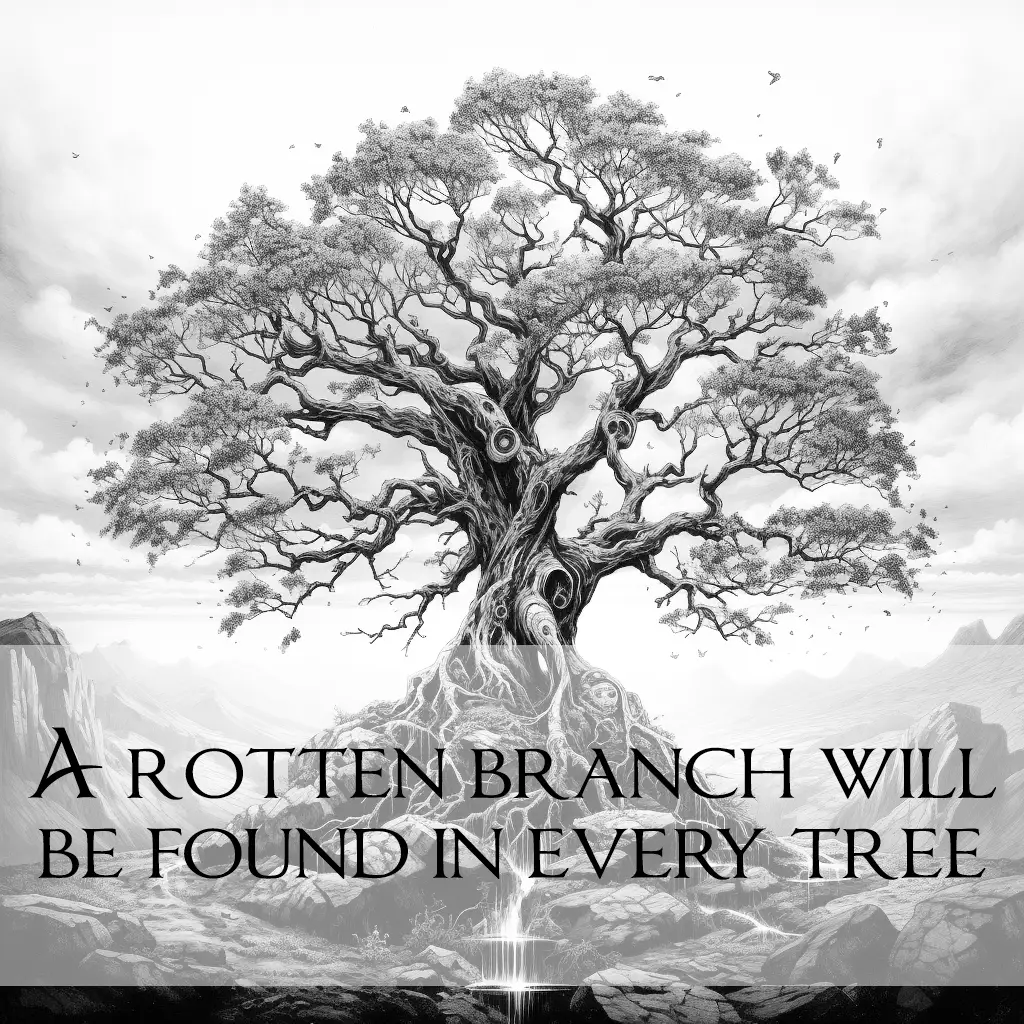
A rotten branch will be found in every tree
“A rotten branch will be found in every tree” from Saga of Olaf Haraldsson, c.148
“A rotten branch will be found in every tree” is a profound metaphorical statement attributed to The Saga of Olaf Haraldsson, circa 148. It suggests that within any system, group, or individual, there are bound to be imperfections or flaws. Just as even the healthiest and sturdiest trees may have a decaying or weak branch, every entity, no matter how strong or noble, will inevitably have some aspect that is flawed or deteriorating.
This saying reflects a universal truth about the human condition and the nature of existence itself. It underscores the idea that perfection is unattainable and that imperfection is an inherent part of life. It encourages humility, reminding us not to idealize or idolize anyone or anything, as all have their shortcomings.
Furthermore, the phrase can also serve as a cautionary reminder to be vigilant and discerning. It advises against blind trust or complacency, urging individuals to remain vigilant and critical, even when dealing with seemingly reputable or admirable figures or institutions. By acknowledging the presence of imperfections, one can approach situations with a more balanced and realistic perspective, thereby avoiding potential pitfalls or disappointments.
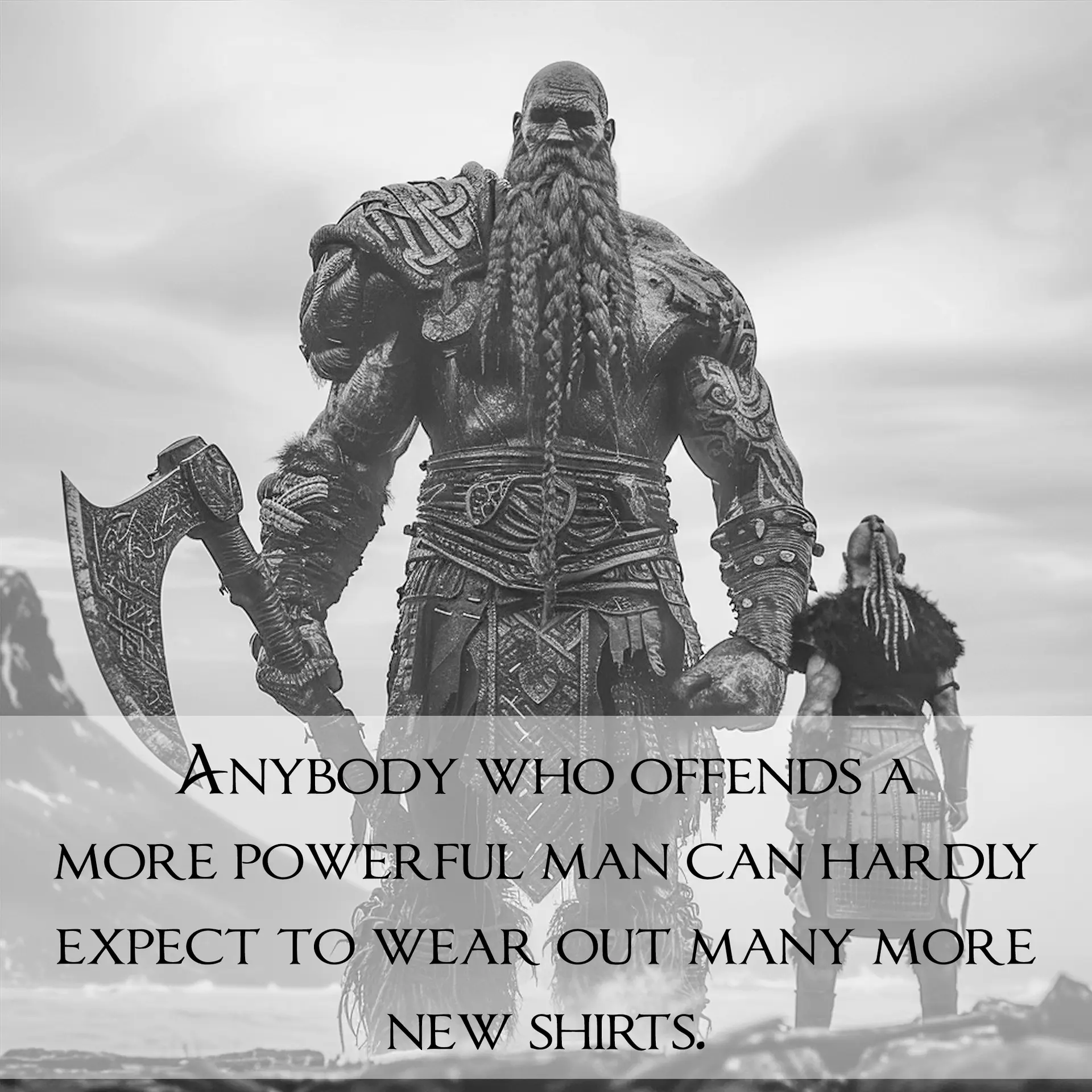
Anybody who offends a more powerful man can hardly expect to wear out many more new shirts.
“Anybody who offends a more powerful man can hardly expect to wear out many more new shirts.”
This quote reflects the harsh realities of Viking society, where power dynamics often determined one’s fate. It suggests that offending or antagonizing someone with greater influence or authority could lead to dire consequences, possibly even death. The imagery of “wearing out many more new shirts” implies that longevity and security are unlikely for those who provoke the wrath of the powerful.
In Viking culture, where honor and vengeance were significant, disrespect or aggression towards someone of higher status could result in severe retribution. This quote serves as a cautionary reminder of the risks involved in challenging those in positions of power and the importance of navigating social hierarchies with care and respect.
Pick your battles wisely.!
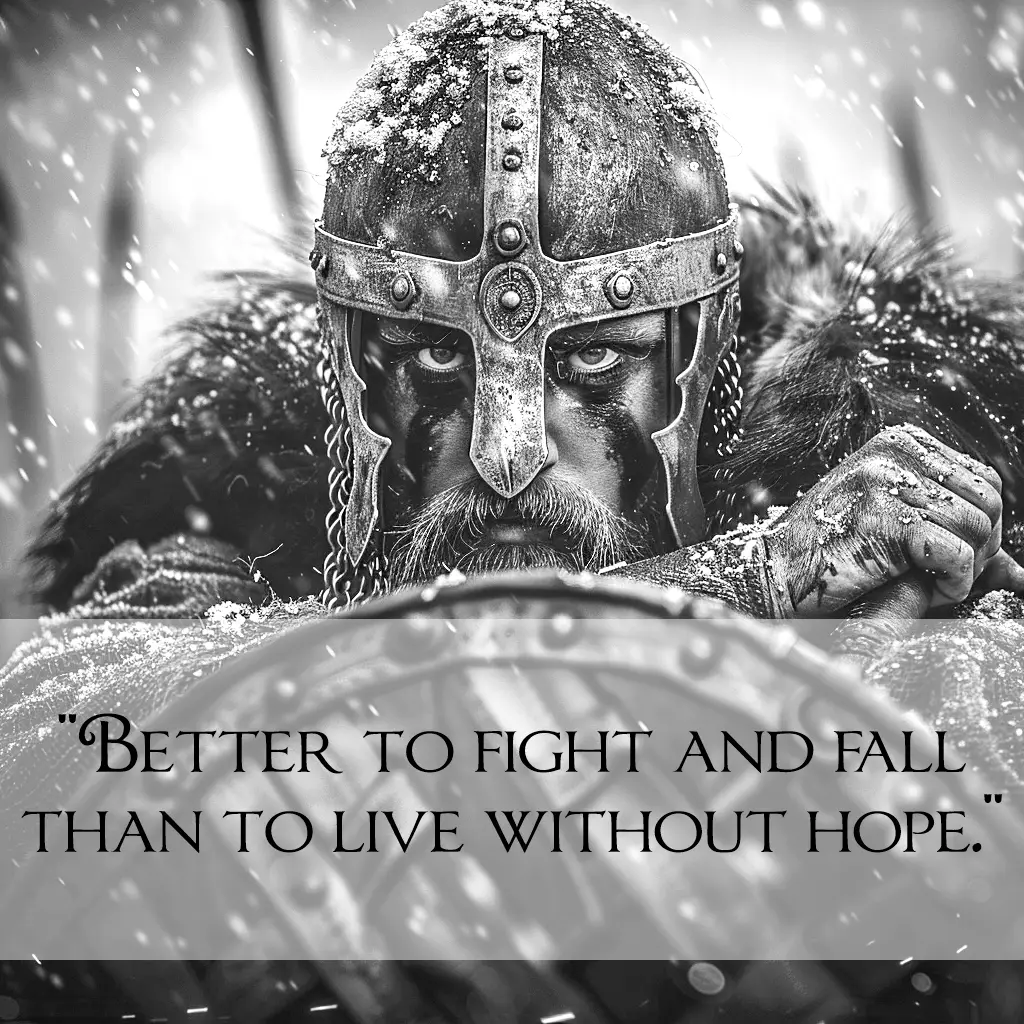
Better to fight and fall than to live without hope
“Better to fight and fall than to live without hope”
The Viking quote “Better to fight and fall than to live without hope” underscores the Viking ethos of valor and resilience. It suggests that it is preferable to face challenges head-on, even if it results in defeat, rather than succumbing to despair and giving up without a fight. This mindset reflects the Viking’s belief in the importance of courage, perseverance, and the indomitable human spirit in the face of adversity. It highlights their willingness to confront life’s obstacles with bravery and determination, regardless of the outcome.
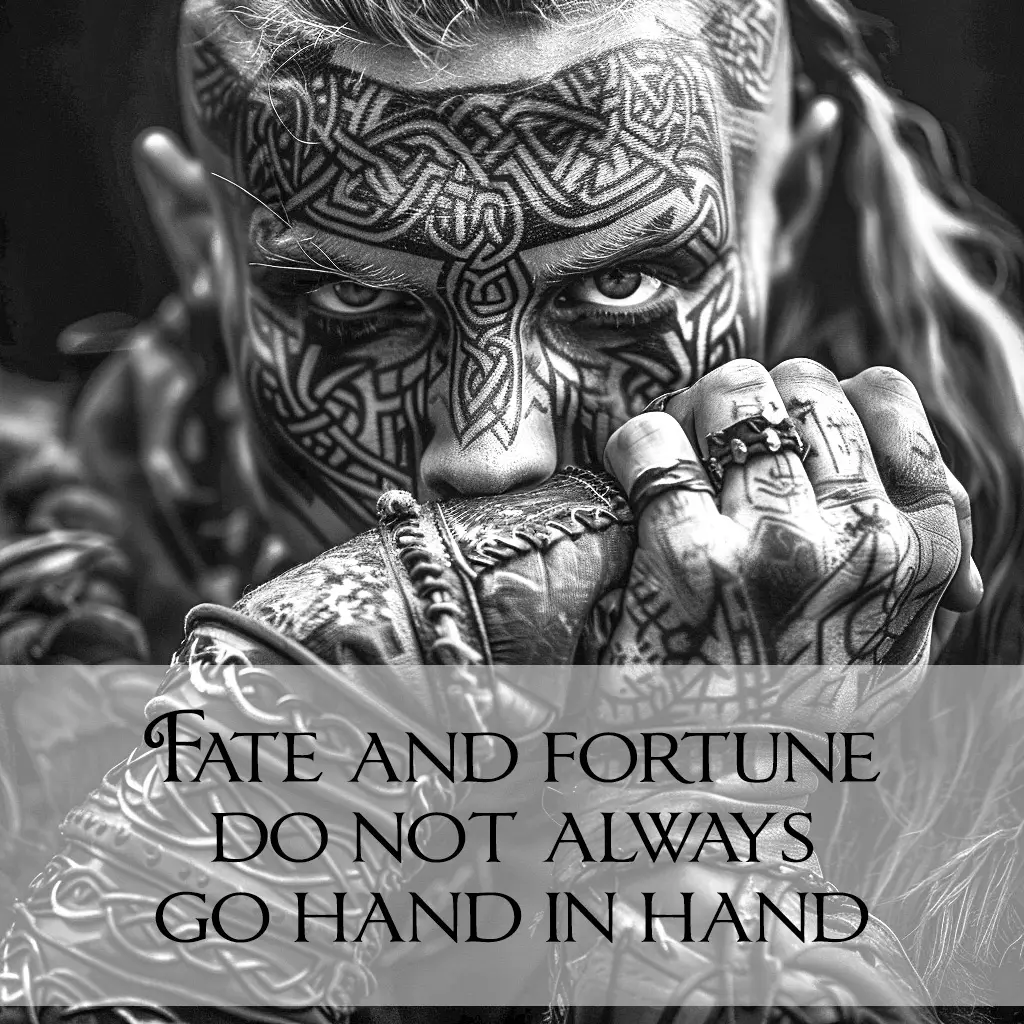
Fate and fortune do not always go hand in hand
“Fate and fortune do not always go hand in hand” is not a traditional Viking saying, but it reflects a sentiment that aligns with Norse beliefs about fate and destiny.
In Norse mythology, fate, or “wyrd” (Old Norse), played a significant role in shaping the lives of both gods and mortals. The concept of fate was intertwined with the idea of a fixed destiny, where events were predetermined and could not be altered. However, Norse mythology also recognized the role of luck or fortune (“hamingja” or “fylgja”) in shaping individual outcomes.
While fate determined the overall course of events, fortune could influence how individuals experienced those events. Sometimes, individuals could defy their fate or change the outcome of a situation through their actions or decisions, but ultimately, fate would prevail in the end.
So, the sentiment expressed in the phrase “Fate and fortune do not always go hand in hand” reflects the understanding that while fate may set the overarching path of one’s life, fortune, luck, or individual agency can still influence specific outcomes along the way.

Gossip often leads to trouble
“Gossip often leads to trouble” encapsulates a fundamental principle in Viking society: the understanding that idle chatter, rumor-mongering, and spreading of falsehoods could have dire consequences.!
For the Vikings, gossip was not merely a harmless pastime but a potentially destructive force capable of fracturing alliances, sowing distrust among kin, and even sparking feuds that could escalate into bloodshed. In tightly-knit communities where reputation was paramount, being the subject of gossip could tarnish one’s honor and standing within the community.
The quote serves as a cautionary reminder to choose words carefully, to speak truthfully, and to refrain from spreading rumors or falsehoods that could harm others or disrupt the harmony of the community. It underscores the importance of integrity, honesty, and discretion in interpersonal communication, values that were integral to Viking society.
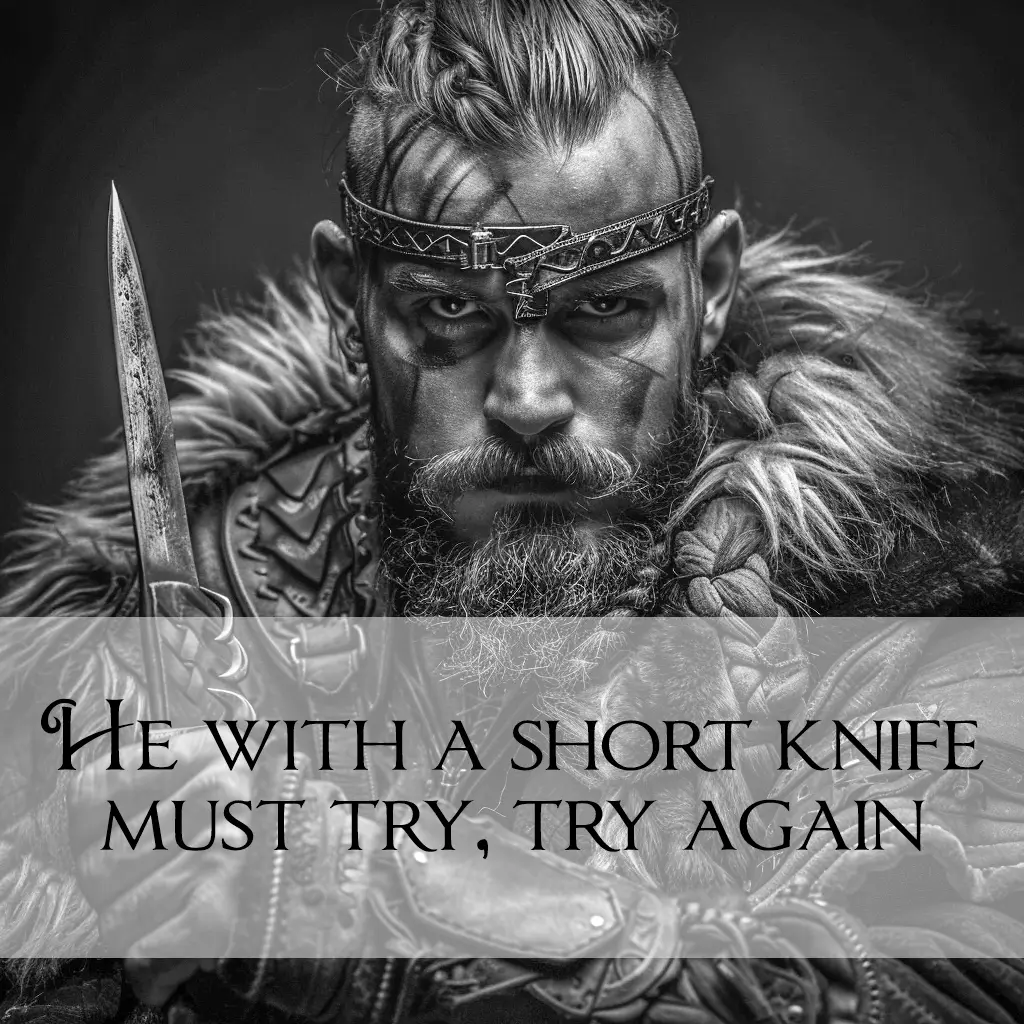
He with a short knife must try, try again
He with a short knife must try, try again
This Viking quote speaks to the resilience and determination required to overcome challenges, even when one’s resources or tools may seem inadequate. In Viking culture, where bravery and courage were highly valued, the metaphor of “a short knife” symbolizes facing adversity with limited means. Despite this limitation, the essence of the quote emphasizes the importance of perseverance and repeated efforts.
It suggests that even when faced with difficult circumstances or obstacles, one should continue to strive and make repeated attempts until success is achieved. This mindset reflects the Viking ethos of perseverance in the face of adversity, embodying the spirit of determination and resilience.
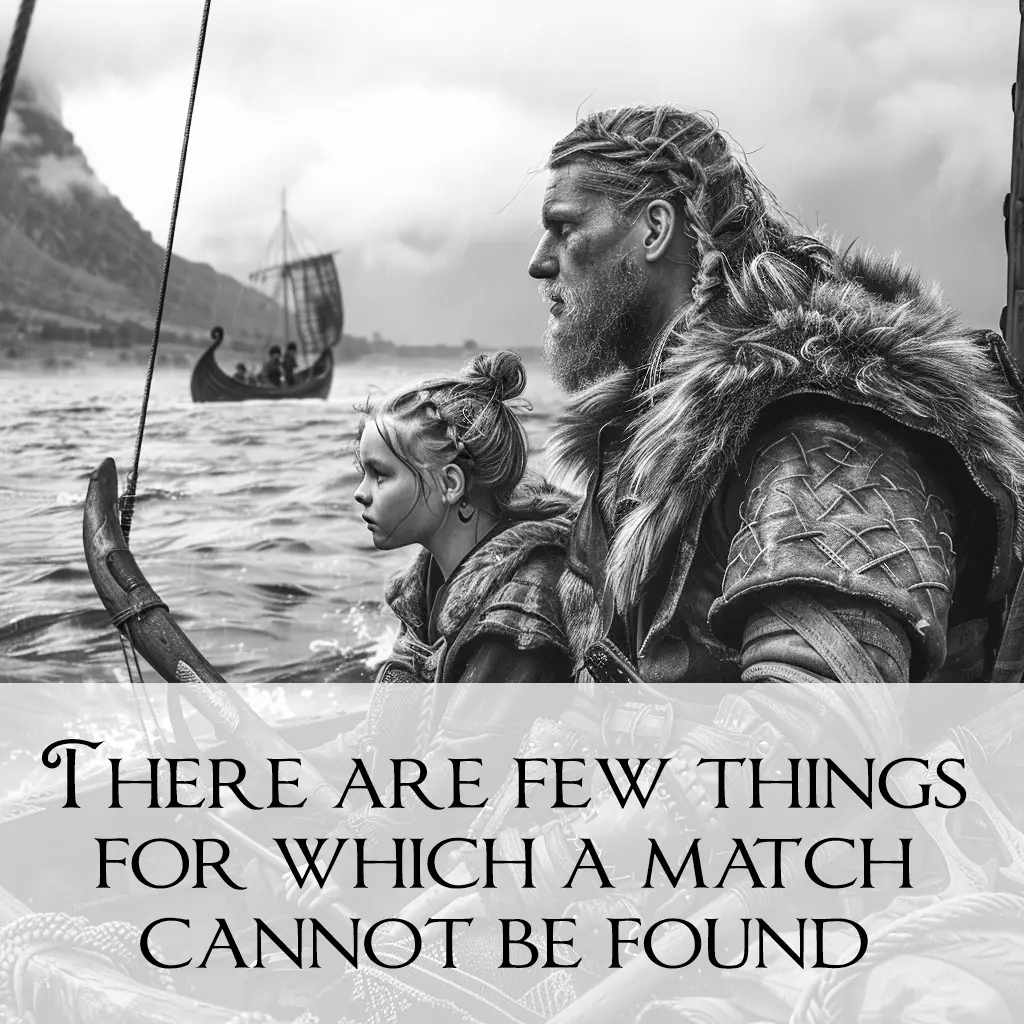
There are few things for which a match cannot be found
The saying “There are few things for which a match cannot be found” in the context of Vikings likely refers to their resourcefulness and adaptability. Vikings were known for their ingenuity and ability to find solutions to various challenges they encountered.
This saying suggests that they believed there were very few problems or obstacles that they couldn’t overcome with the right approach or strategy, much like finding a match for a problem or situation.
Throughout Viking history there are tales of the Vikings overcoming adversity.
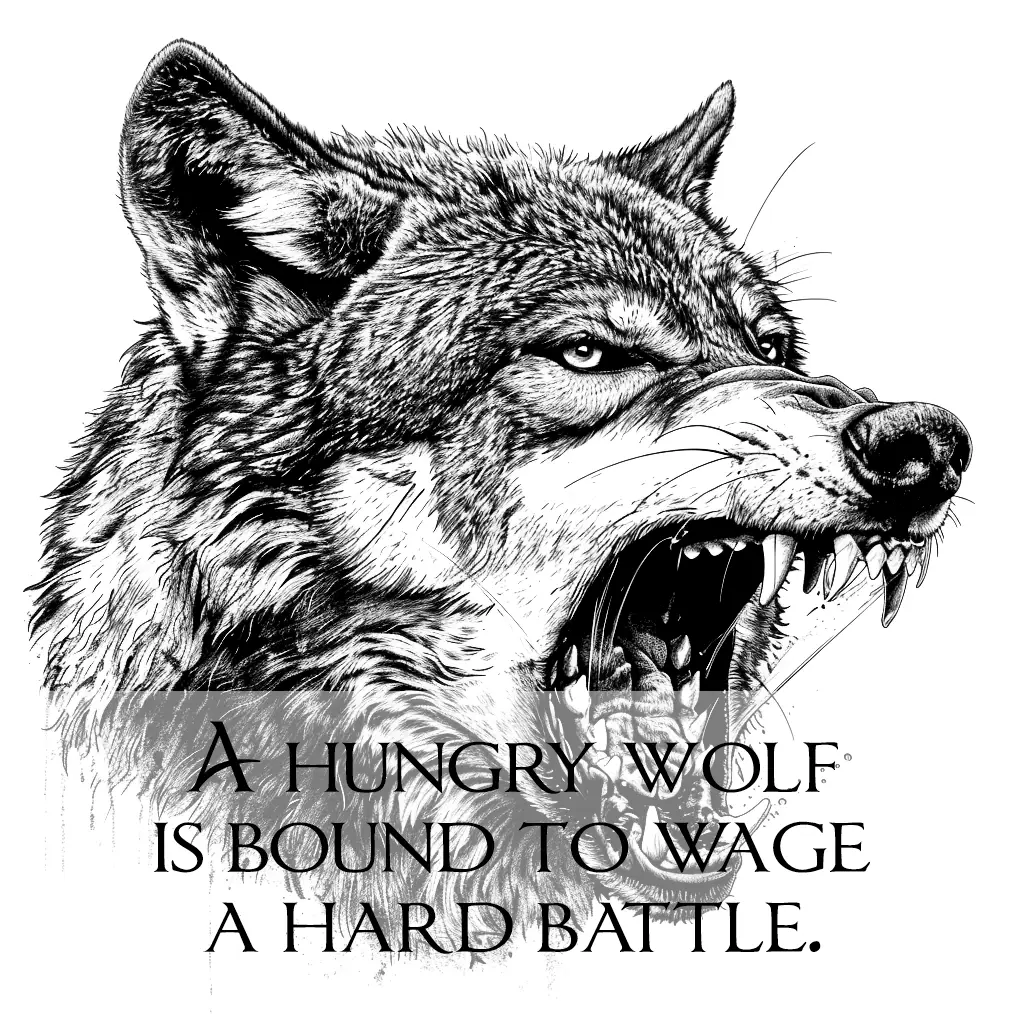
A hungry wolf is bound to wage a hard battle
“A hungry wolf is bound to wage a hard battle” is not a traditional Viking quote, but it does capture the spirit of Norse culture and the Viking mindset. It evokes themes of resilience, determination, and the relentless pursuit of survival that were central to the Viking way of life.
The quote suggests that when faced with adversity or hunger, individuals, much like a wolf, will fight fiercely and relentlessly to overcome challenges and secure their needs. In the context of Viking culture, which was marked by harsh environments, frequent conflicts, and a constant struggle for resources, this sentiment would have resonated deeply with the people of the time.
While the quote may not have originated from Viking sources, it reflects the ethos of strength, endurance, and resourcefulness that characterized Viking society. It captures the idea that in the face of hardship, one must be prepared to fight fiercely and endure hardship to survive and thrive.
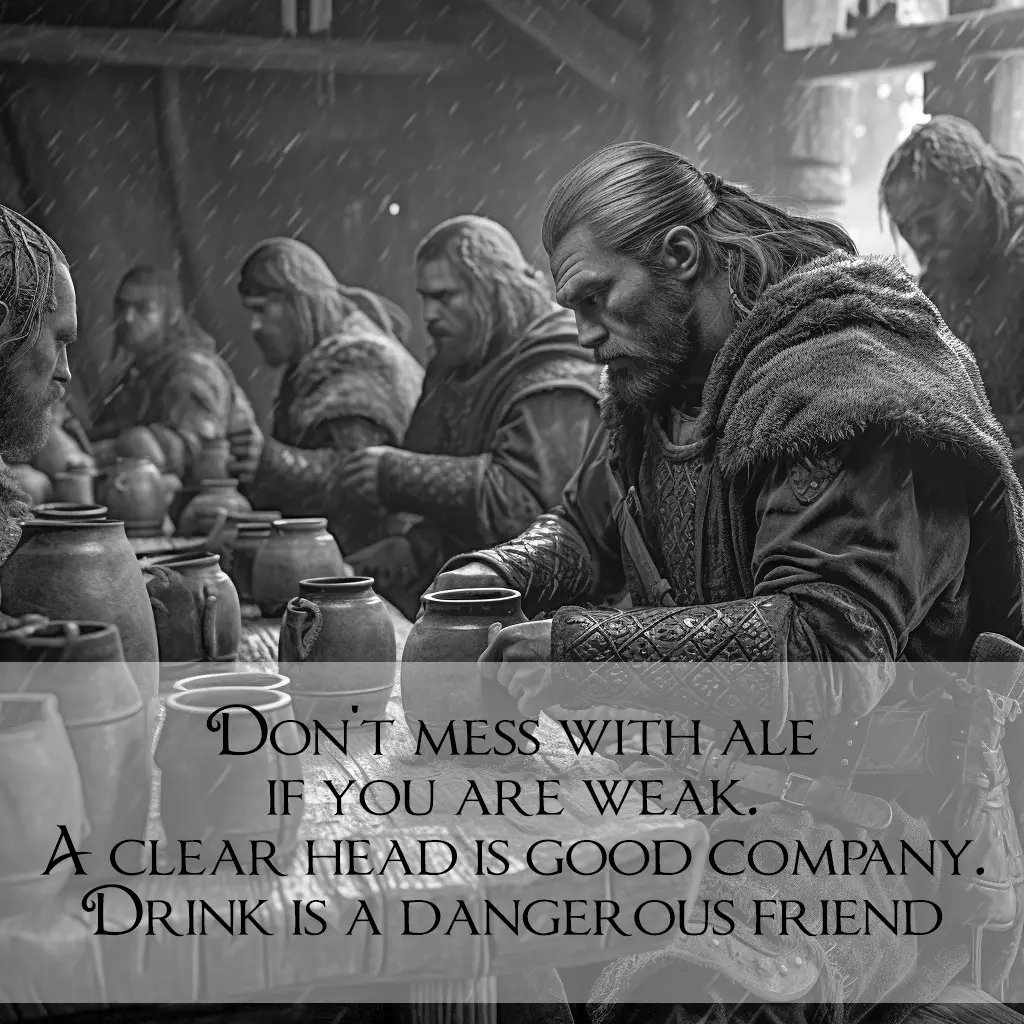
Don’t mess with ale if you are weak. A clear head is good company. Drink is a dangerous friend
“Don’t mess with ale if you are weak. A clear head is good company. Drink is a dangerous friend”
This quote reflects the cautious and pragmatic attitude Vikings had towards alcohol. It highlights the importance of moderation and the potential dangers of overindulgence.
While it’s not a direct translation of any specific Old Norse text, it resonates with the wisdom found in the “Hávamál,” a collection of sayings attributed to the god Odin in the Poetic Edda. Here’s a related passage from the “Hávamál”
Hávamál, Stanza 13 – “Less good there lies than most believe in ale for mortal men; for the more he drinks the less does man of his mind the mastery hold.”
This stanza is particularly relevant to this quote, as it speaks to the dangers of overindulgence in alcohol and the value of maintaining a clear head.
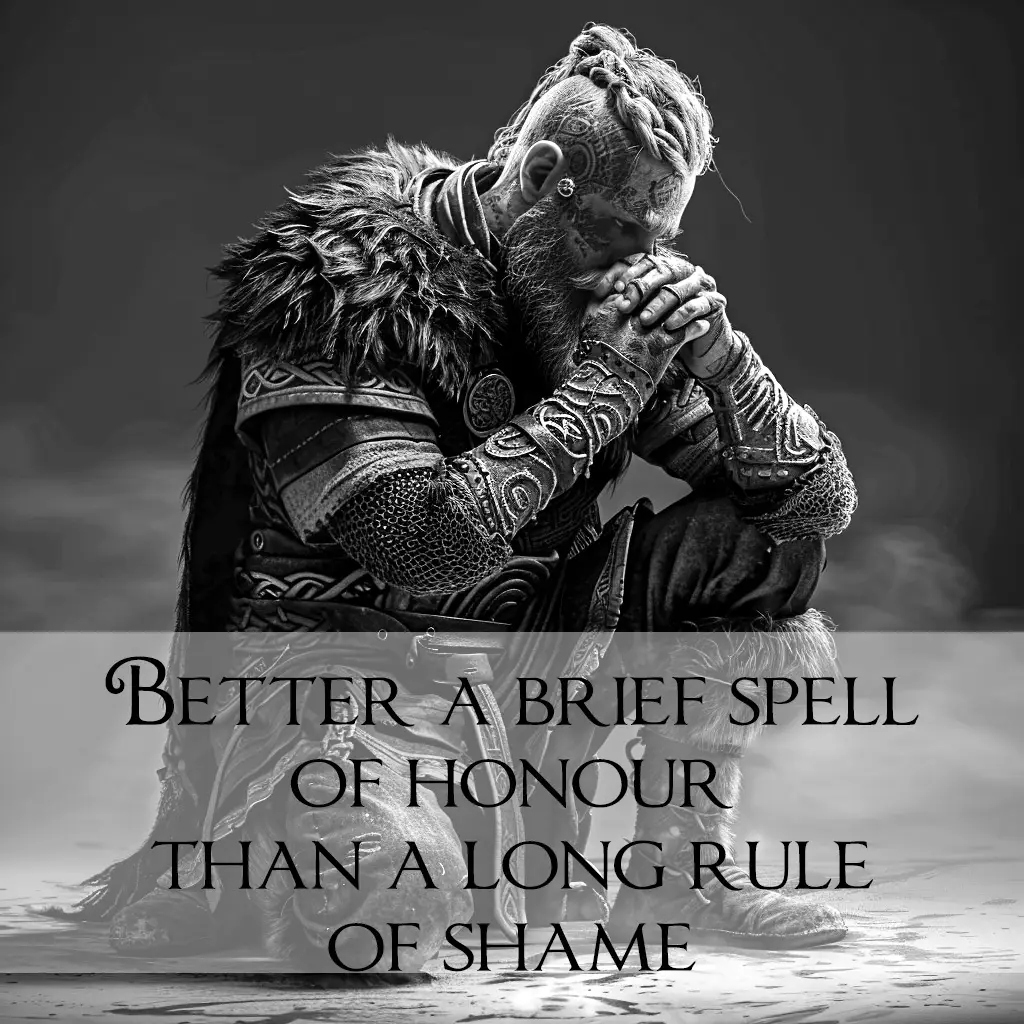
Better a brief spell of honour than a long rule of shame
“Better a brief spell of honour than a long rule of shame”
This Viking quote encapsulates the Viking ethos, which prized honor and reputation above all else. This sentiment is deeply rooted in Norse culture and is reflected in many of their sayings and sagas. Although the exact wording isn’t a direct translation from the “Hávamál,” it aligns with the spirit of several stanzas.
Hávamál, Stanza 76 – “Cattle die, and kinsmen die, and so one dies oneself; one thing I know that never dies: the fame of a dead man’s deeds.”
Modern Paraphrase – “Glory lasts longer than life itself; it’s better to live honourably for a short time than to live a long life in disgrace.”
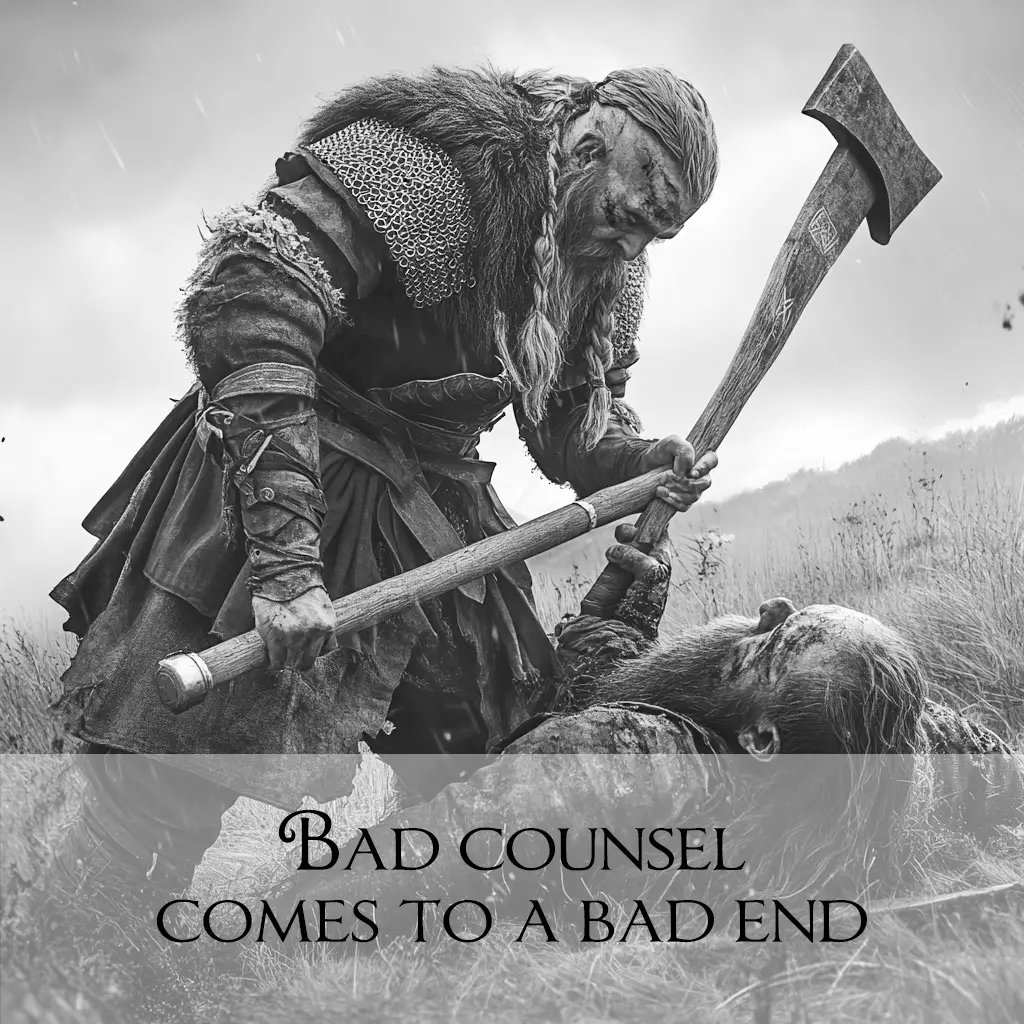
Bad counsel comes to a bad end
“Bad counsel comes to a bad end“
“Bad counsel comes to a bad end” is a phrase that captures the essence of wisdom found in Norse culture, particularly in the Hávamál, a collection of Old Norse poems attributed to Odin. This collection is part of the Poetic Edda and offers practical advice and moral guidelines for living a wise and honorable life.
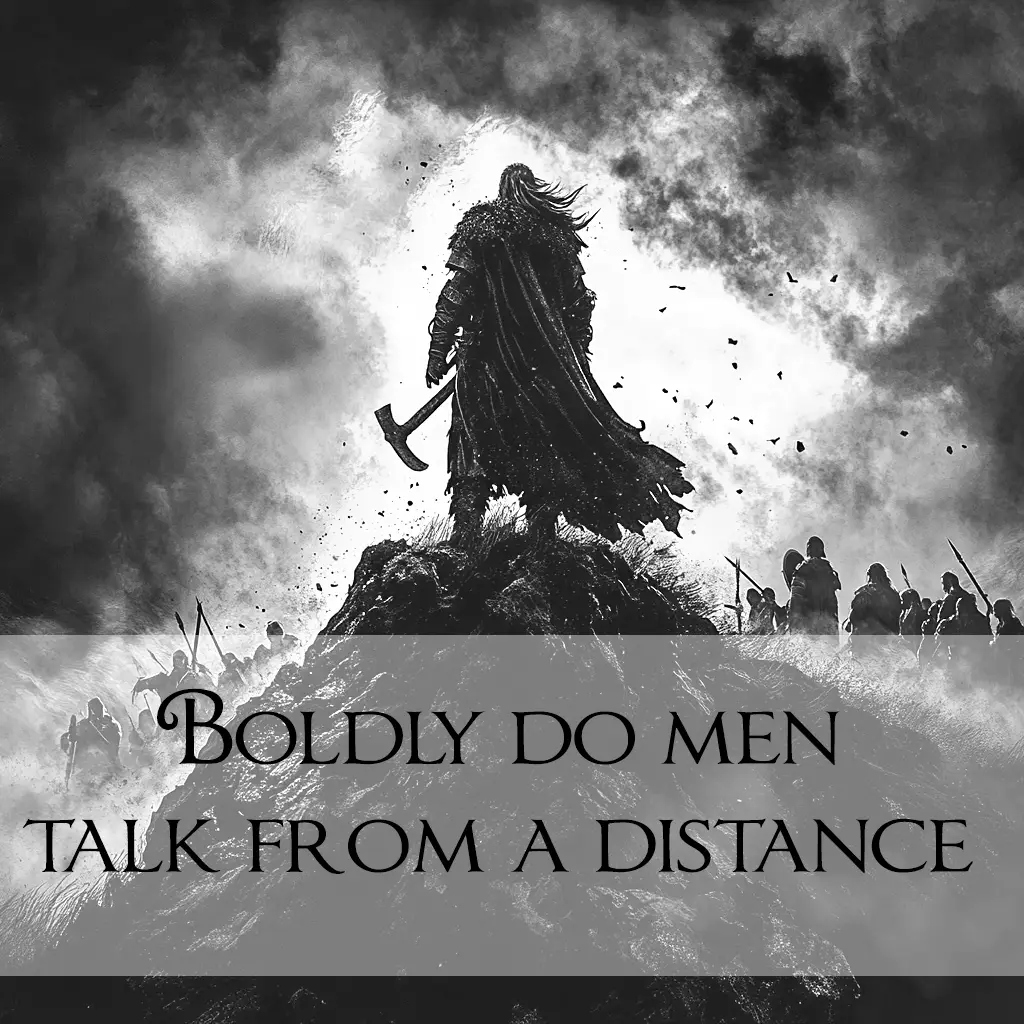
Boldly do men talk from a distance
“There is nothing noble in being superior to your fellow man; true nobility is being superior to your former self”
The quote “Boldly do men talk from a distance” originates from Norse sagas and poetry, reflecting the Viking ethos of bravery, action, and direct confrontation. It conveys the idea that many are quick to boast or criticize when they are far from danger or responsibility but may falter when faced with challenges directly.
Possible Source and Context
This sentiment is reminiscent of the Hávamál, a collection of wisdom attributed to Odin. The text often advises caution, courage, and the value of deeds over words. While the exact phrase may not appear verbatim in Norse texts, its spirit aligns with the themes of Viking culture and sagas, where bravery in person is valued more than bold speech from safety.